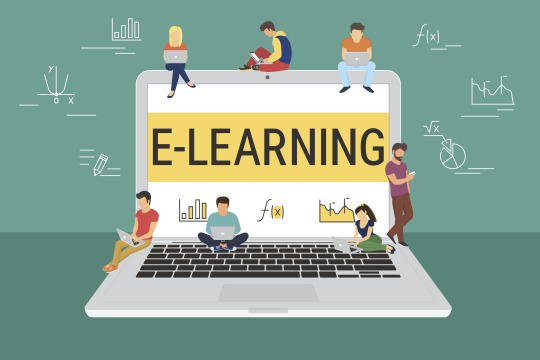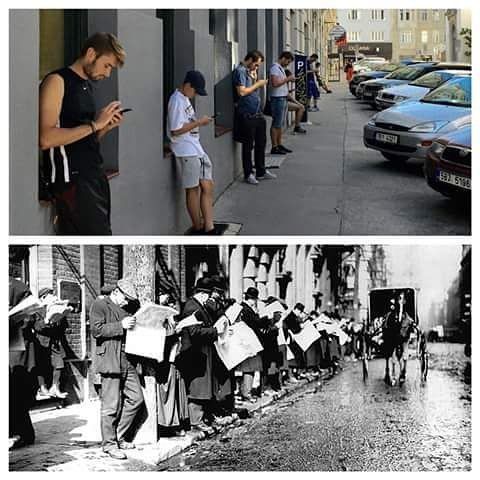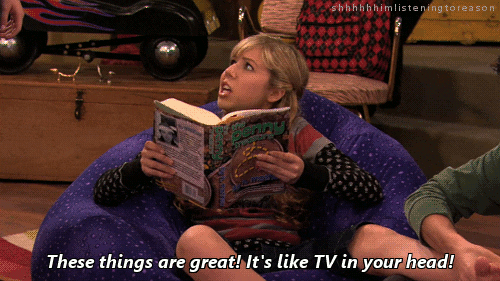Text
Internet and Education

Let’s face it, the purpose of school, especially in kindergarten and elementary school, is babysitting, keeping kids busy, and allowing them to explore and develop social skills. While we try to learn about academic subjects along the way, most of the things I’ve learnt, even in high school, were memorized short term and then promptly forgotten.
Not to say we don’t learn a lot academically in school, because we do. However, I find that academic learning isn’t the most important function of in-school public education. The primary advantage is actually the vital social skills that students develop.
All media have social implications. In this case, that social impact is a decreasing amount of physical communication. In my opinion, physical interactions between students is necessary. Students need to develop the right communication skills and their ability to read social cues and body language. The internet simply isn’t built to sustain this type of learning. Therefore, I think an increase in online education would be a bad idea.
Statistically, my generation is going out less, drinking less, having less sex, and doing less drugs simply because we don’t have to go out to be with our friends; Our friends are online. This has only gotten worse with our increased use of technology and our increased dependence on social media. School seems to be the only release we have from the internet world. It is one of the only places where we actually physically communicate with others. If school were moved online, we wouldn’t have this opportunity. In addition, it would probably increase screen addiction. This, as we’ve discussed in class, is harmful in a number of ways.
However, e-learning does work well for certain people. For example, over the summer I took an e-learning course on Kinesiology. I finished with a 98% in that course. It was easy and quick considering it took me only a month to complete over the summer. Now it was easy partially because I have an excellent short-term memory and that’s all I needed to succeed in that course, but the platform itself was also very accessible to me. Lessons were written out so that I could revisit them easily, lesson hours were flexible as they were always recorded, and my teacher could answer questions I had by email very quickly. However, I don’t think this course should be mandatory. I like having the option to do something online, like civics and careers, but mandatory classes would force every student to make the same decisions I did. Just because it worked for me, doesn’t mean it will work for everyone and giving a choice allows for every student to decide this for themselves. If they are not compatible with online learning, they should have the option to only do in-class studying. If they thrive using online classes, great! They can do it in the summer or during the year, no problem. However, it is the option that counts. That way, every student can figure it out for themselves and this is really important.
In addition to the social implications that I have outlined above, e-learning can be problematic for certain students with learning disabilities or special needs. Class sizes online are larger than normal and anyone who needs special attention from a teacher will be less likely to get it.
0 notes
Text
Deconstructing A Meme
DECONSTRUCTING MEMES

“Driving past work on my day off”
In this scene from Bean (1997), Mr.Bean waves to a man on a motorcycle and gets flipped off in return. Mr.Bean assumes that this is some sort of greeting and starts to flip everyone off along the sidewalk with a smile on his face.
The power of memes is that they can place a picture, video, or gif in a totally different context. Because of the form of the media, memes lend themselves to certain themes and ideas that often represent our inner thoughts or feelings. The smugness and joy on Mr.Bean’s face, for example, perfectly represents how someone feels when they don’t have to go in to work. It has turned an annoying and sometimes painful part of life, working at a job you hate, into a humorous experience. This is something that memes do very well. They often make light of difficult situations by using humour. In my opinion, this meme is a harmless laugh. However, it hints at a fairly recent societal change caused by memes: a shift in the type of humour we enjoy.
I find that now more than ever, dark humour is popular. Memes about the world ending, world war three, or depression and anxiety are not uncommon. Because of the popularity of this type of humour, many comedians, TV shows, and films have started to use it more and more. There has always been dark humour of course, but I feel like in recent years, it has become more of a standard than a genre.
Talking about dark humour, comedian Daniel Sloss said: “it isn’t to belittle the victim or to make fun of the tragedy or any of those other reasons...The reason they [comedians] do it is they are trying to bring a level of humanity, laughter, back to a moment that seems to lack it. Tragedy. They’re trying to make you, the individual, laugh in your moment of sadness so just for the briefest of seconds...you forget how shit things are and you get to have a giggle with yourself.” For this reason, I think the dark, quick, meme humour isn’t a bad thing. I think we should be able to laugh at things like depression and world war three to help us process them. If you actually think about those things like that for too long, you feel hopeless. This kind of hopelessness is poisonous and only feeds anxiety about these topics. Therefore, I think that media like memes can provide comfort. I know plenty of people with anxiety disorders, for example, who see memes about anxiety and it makes them feel better, less alone. Because they relate to the media and it makes them laugh about something that isn’t funny to them. They feel strangely comforted because a meme makes the anxiety less scary and more manageable.
0 notes
Text
Has The Smartphone Destroyed a Generation?

This article explores the fourth concept of media that all media have social and political implications.Going into high school, I expected there to be a lot more drinking, drug use, and crazy nights like you see in the movies, but honestly, over the last four years I’ve realized that these expectations weren’t realistic. Adolescence is so much wilder in movies and TV shows than it is in real life. There are times when I go out and have some “typical” teen experiences but not nearly as much as I expected.
In the movies and from what my parents or older sister, (now 26 years old,) tell me, adolescence used to be kind of a bigger deal. I mean the stuff my older sister did doesn’t even compare to what I’m doing now. She also lived in a world with flip phones and email. She’d sometimes take videos on her computer’s Photobooth and email them to friends or post them on Facebook, but most of the time, she was going out with her friends and experiencing things without filming them or taking tons of pictures. From what I remember, she’d go out every weekend to party and during the week, she’d hangout constantly after school with her friends. I do the same things but way less frequently than she did. Instead, as Jean Twenge describes, I spend a lot of time texting my friends rather than meeting them in person.
However, unlike the teens that Jean Twenge describes, my first exposure to social media was in grade 9. My parents, very old-fashioned and anti-technology, only got me a phone in my first year of high school because they wanted to be able to contact me.
Before I got my phone, it was almost embarrassing that I didn’t have one. Everyone I knew was part of group chats and Instagram and Snapchat and all I had was email on my dad’s computer and a home phone. I felt a certain amount of disconnect from everyone around me because it felt like they had whole other lives on their phones that I didn’t have access to.
I remember watching my friends on Instagram and wondering how it even worked. When I asked and they explained it to me it made me laugh. “Why would you ever want to post about your life? Why would you ever want to scroll through other people’s pictures?” It felt so alien to me at the time.
When I finally got a phone, I downloaded Instagram right away. I tried to download Snapchat as well but as soon as the app started asking for access to my personal information I uninstalled it. Both my parents are very protective of their information so I guess their voices in my head told me to shut it down.
When I opened Instagram for the first time, I expected the instant entertainment that I’d been promised. I’d witnessed friends on Instagram for hours and I couldn’t wait to finally experience what I’d been missing. But I was disappointed. I hadn’t followed anyone yet so my feed was empty. It was boring. I remember talking to a friend and she laughed at me, “you’ll get used to it,” she said. and I did.
I still have Instagram. I don’t post a lot and I have muted anyone who posts every day (can’t stand that) but nonetheless, it is a part of my life and my identity. There are even some people I can only text through Instagram because it is easier to find their account than asking them for their number. It almost seems weird to ask for their number when I could just DM them.
Having a phone and using it in the right way has become so ingrained in our culture that I don’t know how we’re going to get back to the way things were. Personally I’m kind of upset that we’re going out less. I love hanging out in person with my friends and going out because it makes me feel more present, alive, and free.
I miss the sporadic nature of my pre-phone experience. I miss friends just showing up at my door and asking to hang out because they didn’t want to email first. I miss answering the home phone and not knowing who’s calling. I miss waiting to hear about something crazy that happened over the weekend on Monday morning instead of instantly through Instagram. I miss making an impression in person rather than constructing one online. I love my phone and I love how easily it helps me connect and communicate with others but when I’m only socializing using my phone, life feels more 2-dimensional. I think a big part of that is the disconnect between reading words in a text and actually hearing someone say them.
0 notes
Text
Free Choice: Analyzing Michael Bloomberg As a Media Constructed Presidential Candidate

In this blog post, I will be analyzing how 2020 Presidential candidate, Micheal Bloomberg’s campaign video entitled “Get It Done! Mike Bloomberg For President” proves that all media is a construction.
As a presidential candidate, Michael Bloomberg must construct a version of himself to present to the public. He must show Americans that he is intelligent, confident, and above all, a strong leader. He presents this version of himself in ads, speeches, and maintains it through his tv appearances, radio interviews, and promotional videos like the one I will be analyzing today.
The first thing to note is that the video, only a minute long, introduces and then reiterates Bloomberg’s slogan “Mike will get it done” a total of 9 times. Averaging one every 6 seconds. This technique not only emphasizes the message but also adds to his image of a hard and efficient worker who will create positive change as president. He continues to emphasize this image by showing clips of himself ‘working’: talking on the phone urgently, leading a team with a calm, decisive manner, thoughtfully talking with a woman holding a clipboard, and even discussing a 2001 budget excel spreadsheet with an employee.
In one clip, we see a photo of Obama and Mike talking. Bloomberg is explaining something to Obama and they have both crossed their arms and furrowed their brows in concentration. This shows that he is connected. He knows Obama, he’s spoken with him, he agrees with his policies. This will appeal to many Americans as Obama is one of their most beloved presidents. Americans don’t know what the pair were really talking about in that photo, they could have been discussing their favourite flavours of ice cream or the weather, but in the context in which this photo is presented, it seems that the two are talking politics. This photo also serves another purpose; It screams, “Look! I’m not racist!”
Bloomberg is plagued by racist and sexist controversy. As mayor of New York, he enforced and expanded a ‘stop and frisk’ policy which targeted African-American and latino men. After he was called out for it, he continued to defend the policy using more racist remarks. This kind of controversy isn’t good for any political campaign so in this video, we can see how his publicity team tried to show the audience that Mike wasn’t racist by including many people of colour and of course, that picture with Obama.
Another interesting part of this video is the speed of the clips. In 1 minute, we see 36 different shots with an average clip length of 1.7 seconds per shot. That’s not a lot of time to take in each image. In addition, each shot is a smooth pan, an abrupt zoom, or quick still. The speed of the clips and the almost constant movement appeal to an audience that is used to short clips like those found on social media. It is also easier to maintain interest in a video when it is constantly changing.
Video
https://www.youtube.com/watch?v=Xs0p6oNca9s
0 notes
Text
Internet and Literacy: Thanks internet. Now I don’t read.

Ever since the dawn of the digital age, all forms of media have gotten quicker, flashier, and more instant as the public becomes more impatient. With the rise of social media, these effects have become more and more prevalent and as a result, people have started to read novels less and less.
As we discussed in class, the content is shaped by the form of the medium. In this case, I believe that the main reason we are reading less is because of how the form of social media has changed the content we enjoy consuming. This type of content invites us not to commit too much time to each post. It gives us information quickly and in short bursts that we often just scroll past without taking the time to understand. When we use social media a lot, we start to expect this same, quick, non-committal type of learning in other aspects of our lives. We start to desire the mere seconds it takes to engage with something on social media rather than the hours, days, and weeks you would normally commit to a book. As a result, we become more impatient and less willing to take time for reading.
Another reason that the social media has lowered reading levels is that it offers something that a novel doesn’t: instant gratification in the form of a dopamine release in the brain. This is outlined by Trevor Haynes, a research technician in the Department of Neurobiology at Harvard Medical School, in his article titled “Dopamine, Smartphones, & You; A Battle For Your Time”. In this article, Trevor explains that when we get a like or comment on a photo, for example, dopamine is released in the brain because we have had a ‘successful social interaction’. This same release of dopamine cannot be achieved as quickly when reading.It is also not guaranteed that we will enjoy the novel and therefore, something like social media becomes more appealing.
Before I got a phone in grade nine, I read at least a book a week. I always had a book in my bag and when things got slow in class, I’d start to read. However, when I got my phone I started to do this less and less. I also find that I am more impatient when it comes to collecting information. Before I had a phone/computer, I’d read about a subject patiently and thoroughly. Now I find myself skimming articles and books online, impatient to find the information I need in as little time as possible. Even the research for this assignment. I found two or three articles, skimmed them, found facts I liked and jotted them down before clicking away, each article not even taking 5 minutes of my time.
So in conclusion, Instant gratification in the form of a dopamine release and the quick and non-committal nature of social media has changed the way we take in the world and how we choose to get our information. The effect of this is a decrease in reading at every age. In my opinion, this is one of the many downsides to social media. Social media is often shallow and image based whereas a novel is not. Reading also helps us think critically and engages our brains in a way that social media cannot.
Research: http://sitn.hms.harvard.edu/flash/2018/dopamine-smartphones-battle-time/
https://www.psychologytoday.com/us/blog/brain-wise/201605/great-stories-release-brain-chemicals
https://www.theguardian.com/technology/2018/mar/04/has-dopamine-got-us-hooked-on-tech-facebook-apps-addiction
1 note
·
View note